Recent Water Damage Posts
Signs that Your Hot Water Heater is Failing
8/13/2024 (Permalink)
With an average tank size between fifty and one hundred gallons, leaking hot water tanks can be a major source of water damage problems and can flood an entire home and cause significant damage if not detected quickly. But how do you know if your hot water heater is about to fail?
A lack of hot water is the most common sign of a failing hot water heater. Rumbling, creaking or popping noises are another common indicator of an unhealthy water heater. This can mean that sediment is forming on the surface of the water heater or that the unit is on the verge of a crack or leak. Murky or foul-smelling water are also signs of a failing water heater. Additionally, the pressure relief valve opens to release pressure buildup in the water heater and can sometimes fail to function properly. This can have dangerous results and should be inspected by a plumber if you suspect a problem. And finally, pooling water beneath the unit can be a sign of a leaking water tank.
Pooling water beneath a hot water tank can lead to other, more dangerous problems. If your tank sits on a wood surface, the wood can become spongy and rot through if left wet for a long period of time. Be sure to act quickly if you know your hot water tank is leaking to avoid this problem.
If you see any of these common indicators, contact a plumber immediately to help determine the source of the problem. And if you do experience a water leak or damage of any kind, call the experts at SERVPRO of Vacaville/Dixon/ Fairfield/Davis to help you remediate all of your water problems.
At SERVPRO of Vacaville/Dixon/Fairfield/Davis, we are experts at assessing water damage in your home or business, as well as removing standing water and drying out damaged materials. We are available 24 hours a day 7 days a week to answer your calls and respond to any and all water emergencies you may experience. Call us today at (707) 724-8977. We live and work in your community and we are here for you.
Check your Air Conditioner Drains
8/7/2023 (Permalink)
Summer is here, so a working air conditioner is more important than any other time of the year. But there are more things to think about than just whether or not the unit is pumping out cool air. It’s also imperative that you make sure that your air conditioner is not causing damage to unseen areas of your home. In order to ensure this, you should understand a little about how air conditioners work and what to look out for to make sure they are working correctly.
Many air conditioning units are located in the attic of a home and work by taking in warm air, chilling it and pumping out the cooler air. When you chill the air, condensation is produced, which is just water. That water needs to be directed out of the attic, and this is done through a condensation drain that drains out of a house at ground level. You may see water dripping from a drain up against your home when your air conditioner is running. This is the condensation being drawn away from the air conditioner and means that the drain is working properly.
Sometimes, however, drains stop working properly because they get plugged so homebuilders have designed a very creative solution for recognizing when this happens. If you have ever seen water dripping from a drain over a window during the summer when your air conditioner is running, this is an indication that your condensation drain is plugged and water is now be rerouted to the emergency drain. That drain is purposely routed to dump water over a window so homeowners will notice that there is a problem with the drain of their air conditioning unit. If not addressed, the excess water can lead to water damage and mold growth, something SERVPRO of Vacaville/Dixon/Fairfield/Davis has a lot of experience eradicating. Although we would be available to help with all your water and mold remediation needs, we also are happy to offer homeowners help in avoiding damage in the first place.
So if it’s a hot day and you notice water running down your window, check to see if it is coming from a drain located directly above the window. If it is, your air conditioning drain is likely plugged and you should get it checked out as soon as possible to avoid water damage to your attic.
If you do experience water, fire or mold damage in your home, call the experts at SERVPRO today. We are available 24 hours a day 7 days a week to respond to your needs. We are local and Here to Help. Call us today at 707-724-8977.
SERVPRO of Davis Helps with Water Restoration
9/5/2022 (Permalink)
Sometimes, accidents just happen. And sometimes, although we take all the necessary precautions and prevention measures to keep them from happening, they do anyhow. When those accidents involve water, it gets messy very quickly. That’s when you need to call the professionals at SERVPRO of Davis. We are available 24 hours a day 7 days a week to help you clean up those accidents involving water that went where it shouldn’t when it shouldn’t. We can help you extract standing water, dry out the materials that are wet and remove any parts of your home or business that need to be removed or replaced because of water damage.
If your home or business experience water damage, call the experts at SERVPRO of Davis today at 707-724-8977. We’re Here To Help.
Air Conditioner Drains Can Cause Water Damage If Plugged
7/26/2022 (Permalink)
Summer is here, so a working air conditioner is more important than any other time of the year. But there are more things to think about than just whether or not the unit is pumping out cool air. It’s also imperative that you make sure that your air conditioner is not causing damage to unseen areas of your home. In order to ensure this, you should understand a little about how air conditioners work and what to look out for to make sure they are working correctly.
Many air conditioning units are located in the attic of a home and work by taking in warm air, chilling it and pumping out the cooler air. When you chill the air, condensation is produced, which is just water. That water needs to be directed out of the attic, and this is done through a condensation drain that drains out of a house at ground level. You may see water dripping from a drain up against your home when your air conditioner is running. This is the condensation being drawn away from the air conditioner and means that the drain is working properly.
Sometimes, however, drains stop working properly because they get plugged so homebuilders have designed a very creative solution for recognizing when this happens. If you have ever seen water dripping from a drain over a window during the summer when your air conditioner is running, this is an indication that your condensation drain is plugged and water is now be rerouted to the emergency drain. That drain is purposely routed to dump water over a window so homeowners will notice that there is a problem with the drain of their air conditioning unit. If not addressed, the excess water can lead to water damage and mold growth, something SERVPRO of Vacaville/Dixon/Fairfield/Davis has a lot of experience is eradicating. Although we would be available to help with all your water and mold remediation needs, we also are happy to offer homeowners help in avoiding damage in the first place.
So if it’s a hot day and you notice water running down your window, check to see if it is coming from a drain located directly above the window. If it is, your air conditioning drain is likely plugged and you should get it checked out as soon as possible to avoid water damage to your attic.
If you do experience water, fire or mold damage in your home, call the experts at SERVPRO today. We are available 24 hours a day 7 days a week to respond to your needs. We are local and Here to Help. Call us today at 707-724-8977.
Avoid Standing Water Near Your Home
6/17/2022 (Permalink)
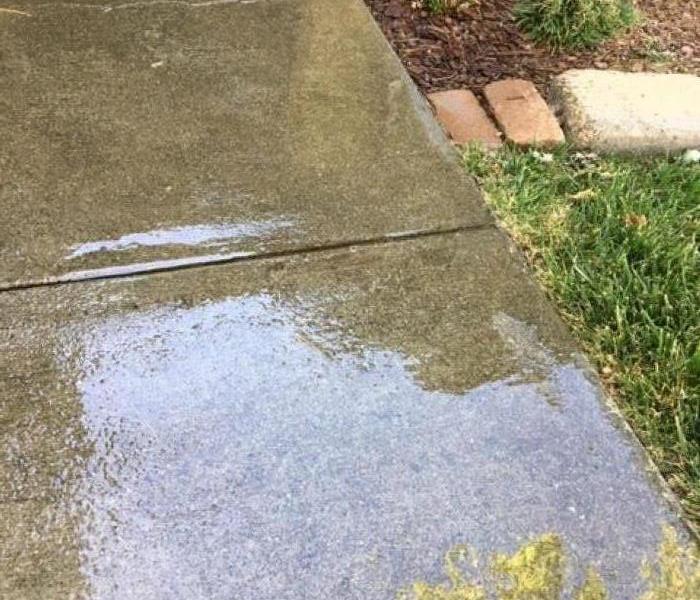 Standing water can bring many problems. Use the tips provide by SERVPRO to help avoid problems around your home.
Standing water can bring many problems. Use the tips provide by SERVPRO to help avoid problems around your home.
Summertime brings with it fun activities like squirt gun fights and running through the sprinklers, but what happens if the water from these activities don't drain away and result in pools of standing water? Even a small amount of water left undisturbed for a few days can cause a significant amount of problems. Outside, standing water can become a breeding ground for mosquitoes, which commonly breed in shallow pools of standing water and often carry diseases including malaria, West Nile virus, and Zika fever. Additionally, water left standing against your home may lead to problems with your home’s foundation.
Here are a few things to check to make sure you don't have any potential hazards around your home.
- Empty, drain or cover all things that can and may hold standing water
- Change water collection pans for planted pots weekly
- Clean bird baths on a regular basis
- Check your landscaping drainage and ensure that it drains away from your home
- Be sure you are not overwatering your lawn. Adjust the watering schedule to water less frequently or for shorter periods of time.
Water can provide a lot of fun during the summer months, but it can cause some problems. Use these ideas to keep your home safe from standing water pitfalls.
These tips are brought to you by your local SERVPRO office. We are here 24 hours a day 7 days a week if you have any water, fire or mold emergencies. Call us anytime at (707) 724-977. We serve the Vacaville, Dixon, Fairfield, and Davis areas and are always Here To Help.
Deodorization Techniques to Help Eliminate Odors
6/15/2022 (Permalink)
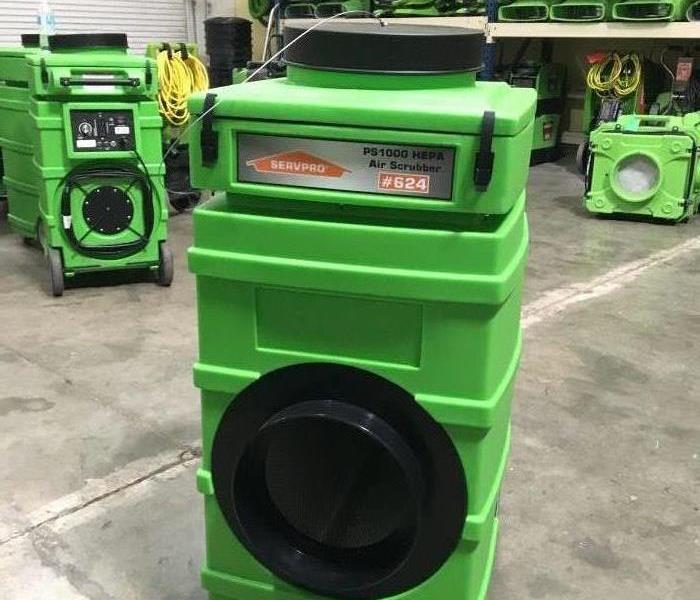 Air scrubbers can help eliminate odors left behind after water damage has occurred. Call SERVPRO today at (707) 724-8977 to see how we can help.
Air scrubbers can help eliminate odors left behind after water damage has occurred. Call SERVPRO today at (707) 724-8977 to see how we can help.
Dealing with the aftermath of water or flood damage can be an uphill battle for any homeowner or business owner. Water often seeps into structural cavities and creates a damp atmosphere. Not only does this pose a threat to the structural integrity of your home, it usually causes an odor problem. If not appropriately deodorized, this foul smell can linger in your home long after the water is gone.
Thankfully, here at SERVPRO, we use a multi-method approach to eliminate odors after water damage to your property has occurred. Our IICRC certified professionals use modern equipment to eliminate odors due to flood damage. Here are some of the deodorizing techniques used to ensure elimination of odors.
*Direct spraying: As the name implies, a deodorant is sprayed directly on the affected area using a pump. The method is useful if the intensity of the smell is not very high and the affected area is small.
*Wet fogging: This method utilizes Ultra Low Volume (ULV) foggers to dispense water or solvent-based deodorants. The ULV fogger generates minute particles of the chemicals that penetrate to the areas where the odor causing particles hide and change the composition of these substances.
*Thermal fogging: The technique involves using heat to break up solvent-based deodorants into small particles that can get to the difficult to reach places. The deodorizing particles neutralize the odor-causing molecules right at the source. Although this method is most popular to deodorize after smoke damage, it is sometimes used for flood damage as well.
*Venting box fans: These are high-velocity axial fans that are used to ventilate and improve air circulation. These fans are used both before and after the deodorizing process. They can significantly shorten the time needed to deodorize and remove moisture at the same time.
*Air Scrubbers: These devices are sophisticated air filters that use High-Efficiency Particulate Air (HEPA) filtration technology. The air scrubbers can capture and eliminate odor-causing particles as small as 0.3 micrometers with an efficiency of 99.97%.
Getting rid of the stale, clammy odor can be a difficult thing to do after water damage has occurred, but the professionals at SERVPRO of Vacaville/Dixon/Fairfield/Davis can help you eliminate the odor and get your home smelling like home again!
Call SERVPRO of Vacaville/Dixon/Fairfield/Davis at (707) 724-8977 to talk to one of our water damage restoration experts and discuss your deodorizing options. We are here 24 hours a day 7 days a week and are always Here To Help.
How To Tell If Your Hot Water Heater Is Going to Fail Soon
6/14/2022 (Permalink)
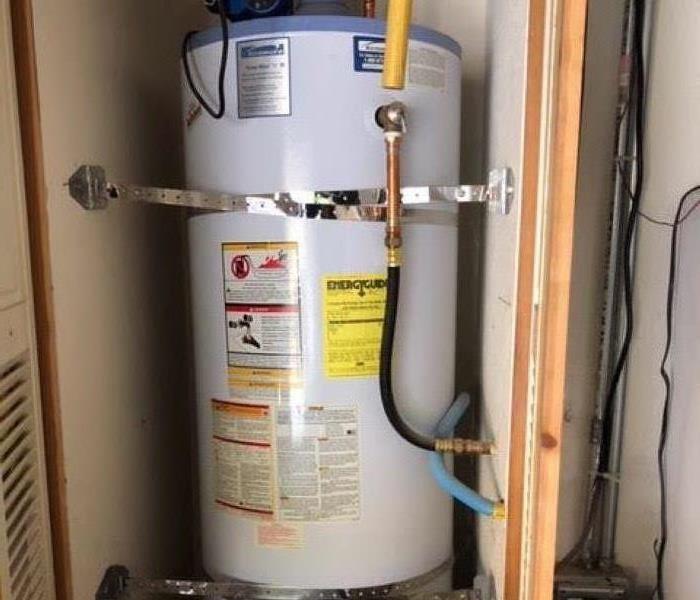 Keeping your hot water tank healthy is one way to avoid water damage in your home or business.
Keeping your hot water tank healthy is one way to avoid water damage in your home or business.
With an average tank size between fifty and one hundred gallons, leaking hot water tanks can be a major source of water damage problems and can flood an entire home and cause significant damage if not detected quickly. But how do you know if your hot water heater is about to fail?
A lack of hot water is the most common sign of a failing hot water heater. Rumbling, creaking or popping noises are another common indicator of an unhealthy water heater. This can mean that sediment is forming on the surface of the water heater or that the unit is on the verge of a crack or leak. Murky or foul-smelling water are also signs of a failing water heater. Additionally, the pressure relief valve opens to release pressure buildup in the water heater and can sometimes fail to function properly. This can have dangerous results and should be inspected by a plumber if you suspect a problem. And finally, pooling water beneath the unit can be a sign of a leaking water tank.
Pooling water beneath a hot water tank can lead to other, more dangerous problems. If your tank sits on a wood surface, the wood can become spongy and rot through if left wet for a long period of time. Be sure to act quickly if you know your hot water tank is leaking to avoid this problem.
If you see any of these common indicators, contact a plumber immediately to help determine the source of the problem. And if you do experience a water leak or damage of any kind, call the experts at SERVPRO of Vacaville/Dixon/ Fairfield/Davis to help you remediate all of your water problems.
At SERVPRO of Vacaville/Dixon/Fairfield/Davis, we are experts at assessing water damage in your home or business, as well as removing standing water and drying out damaged materials. We are available 24 hours a day 7 days a week to answer your calls and respond to any and all water emergencies you may experience. Call us today at (707) 724-8977. We live and work in your community and we are here for you.
Tips for Responding to Water Damage in Your Home
2/12/2022 (Permalink)
If you experience water damage in your home, be sure to call the experts at SERVPRO of Vacaville/Dixon/Fairfield/Davis as soon as you notice any damage. Our restoration specialists have the experience, expertise and equipment to restore your property properly. In the meantime, here are a few tips to keep in mind which may help minimize the damage done to your home.
What To Do After Flooding
- Remove excess water by mopping and blotting.
- Wipe excess water from wood furniture.
- Remove and prop wet upholstery and cushions.
- Place aluminum foil or wood blocks between furniture legs and wet carpeting.
- During the summer, turn air conditioning on for maximum drying effect.
- Remove colored rugs from wet carpeting.
- Remove art objects to a safe, dry place.
- Hang leather goods and furs.
DON’T
- Don't use your household vacuum to remove water.
- Don't use your television or other household appliances.
- Don't turn on ceiling fixtures if the ceiling is wet, and keep out of rooms where ceilings are sagging.
- Don't leave wet fabrics in place.
- Don't leave books, magazines or other colored items on wet carpet or floors.
The specialists at SERVPRO of Vacaville/Dixon/Fairfield/Davis are on call 24-hours a day to respond to your residential or commercial emergency. If you have any questions, give us a call today at (707) 724-8977.
When You Wake Up To A Problem
11/2/2021 (Permalink)
A lot of things happen in our homes the middle of the night that we aren’t even aware of…some good, some bad. The refrigerator keeps cooling our food, the heater keeps us warm and water keeps flowing through our home where it needs to go. But sometimes, we wake up in the morning to an unpleasant surprise, as a recent customer of ours did when they woke up to find that their toilet had been leaking throughout the night leaving their bathroom, hallway and adjoining bedroom floors soaking wet. Their first call in the morning was to SERVPRO of Vacaville/Dixon/Fairfield/Davis.
Our crews were able to respond immediately to help extract the water and perform moisture mapping to determine how far the water had traveled. They also pulled the carpet pad and lifted the carpet to begin drying. In addition, it was necessary to pull the baseboards and drill holes in it for cavity drying to minimize the severity of the damage. After the emergency demolition took place, our crews set drying equipment and plans to return to see if any additional demo is needed.
This is the expert service you get from the experienced professionals when you call SERVPRO of Vacaville/Dixon/Fairfield/Davis. We are here for all of your water, fire and mold restoration needs 24 hours a day 7 days a week. Call us anytime at 707-724-8977. We are Here To Help.
Let SERVPRO of Davis Help with Your Water Accidents
9/22/2021 (Permalink)
Sometimes, accidents just happen. And sometimes, although we take all the necessary precautions and prevention measures to keep them from happening, they do anyhow. When those accidents involve water, it gets messy very quickly. That’s when you need to call the professionals at SERVPRO of Davis. We are available 24 hours a day 7 days a week to help you clean up those accidents involving water that went where it shouldn’t when it shouldn’t. We can help you extract standing water, dry out the materials that are wet and remove any parts of your home or business that need to be removed or replaced because of water damage.
If your home or business experience water damage, call the experts at SERVPRO of Davis today at 707-724-8977. We’re Here To Help.
Plugged Air Conditioner Drains Can Cause Major Problems
7/30/2021 (Permalink)
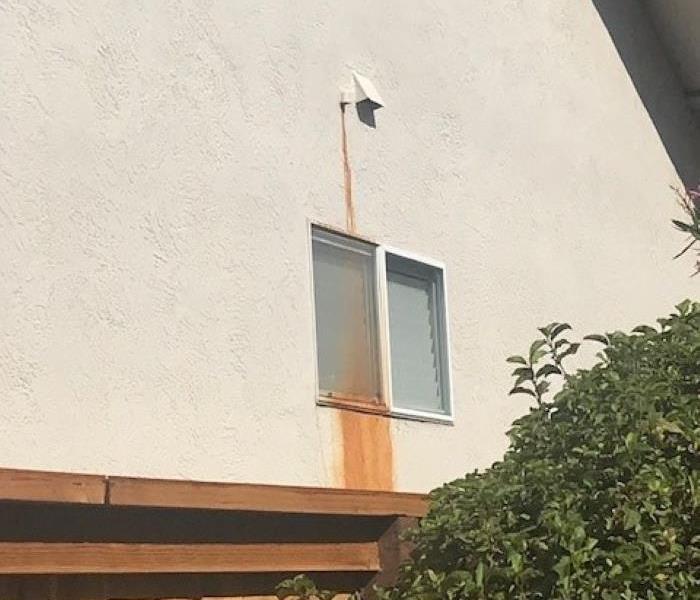 This clogged condensation drain is obviously plugged and dripping water down the side of a home. The excess water can lead to water damage.
This clogged condensation drain is obviously plugged and dripping water down the side of a home. The excess water can lead to water damage.
Summer is here, so a working air conditioner is more important than any other time of the year. But there are more things to think about than just whether or not the unit is pumping out cool air. It’s also imperative that you make sure that your air conditioner is not causing damage to unseen areas of your home. In order to ensure this, you should understand a little about how air conditioners work and what to look out for to make sure they are working correctly.
Many air conditioning units are located in the attic of a home and work by taking in warm air, chilling it and pumping out the cooler air. When you chill the air, condensation is produced, which is just water. That water needs to be directed out of the attic, and this is done through a condensation drain that drains out of a house at ground level. You may see water dripping from a drain up against your home when your air conditioner is running. This is the condensation being drawn away from the air conditioner and means that the drain is working properly.
Sometimes, however, drains stop working properly because they get plugged so homebuilders have designed a very creative solution for recognizing when this happens. If you have ever seen water dripping from a drain over a window during the summer when your air conditioner is running, this is an indication that your condensation drain is plugged and water is now be rerouted to the emergency drain. That drain is purposely routed to dump water over a window so homeowners will notice that there is a problem with the drain of their air conditioning unit. If not addressed, the excess water can lead to water damage and mold growth, something SERVPRO of Vacaville/Dixon/Fairfield/Davis has a lot of experience is eradicating. Although we would be available to help with all your water and mold remediation needs, we also are happy to offer homeowners help in avoiding damage in the first place.
So if it’s a hot day and you notice water running down your window, check to see if it is coming from a drain located directly above the window. If it is, your air conditioning drain is likely plugged and you should get it checked out as soon as possible to avoid water damage to your attic.
If you do experience water, fire or mold damage in your home, call the experts at SERVPRO today. We are available 24 hours a day 7 days a week to respond to your needs. We are local and Here to Help. Call us today at 707-724-8977.
Standing Water Can Cause Problems
6/21/2021 (Permalink)
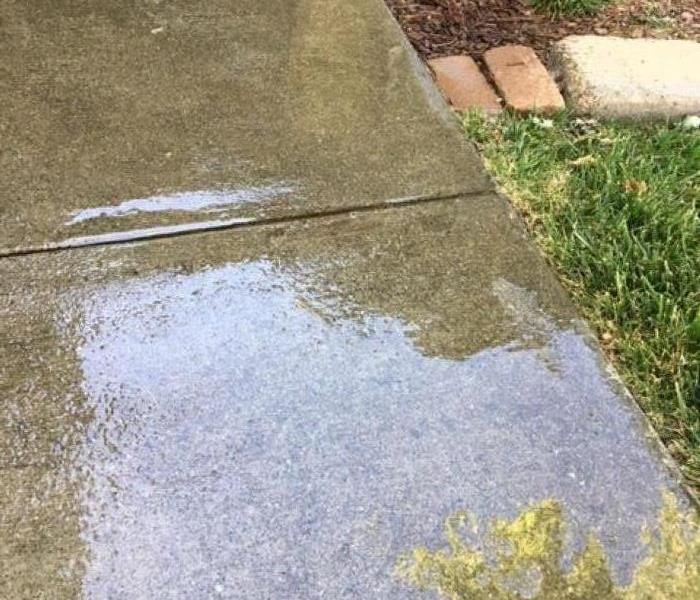 Standing water can bring many problems. Use these tips to avoid this summer dilemma.
Standing water can bring many problems. Use these tips to avoid this summer dilemma.
Summertime brings with it fun activities like squirt gun fights and running through the sprinklers, but what happens if the water from these activities don't drain away and result in pools of standing water? Even a small amount of water left undisturbed for a few days can cause a significant amount of problems. Outside, standing water can become a breeding ground for mosquitoes, which commonly breed in shallow pools of standing water and often carry diseases including malaria, West Nile virus, and Zika fever. Additionally, water left standing against your home may lead to problems with your home’s foundation.
Here are a few things to check to make sure you don't have any potential hazards around your home.
- Empty, drain or cover all things that can and may hold standing water
- Change water collection pans for plant pots weekly
- Clean bird baths on a regular basis
- Check your landscaping drainage and ensure that it drains away from your home
- Be sure you are not overwatering your lawn. Adjust the watering schedule the water less frequently or for shorter periods of time.
Water can provide a lot of fun during the summer months, but it can cause some problems. Use these ideas to keep your home safe from standing water pitfalls.
These tips are brought to you by your local SERVPRO office. We are here 24 hours a day 7 days a week if you have any water, fire or mold emergencies. Call us anytime at (707) 724-977. We serve the Vacaville, Fairfield, Dixon and Davis areas are are always Here To Help.
Is Your Hot Water Heater Going To Fail Soon?
6/18/2021 (Permalink)
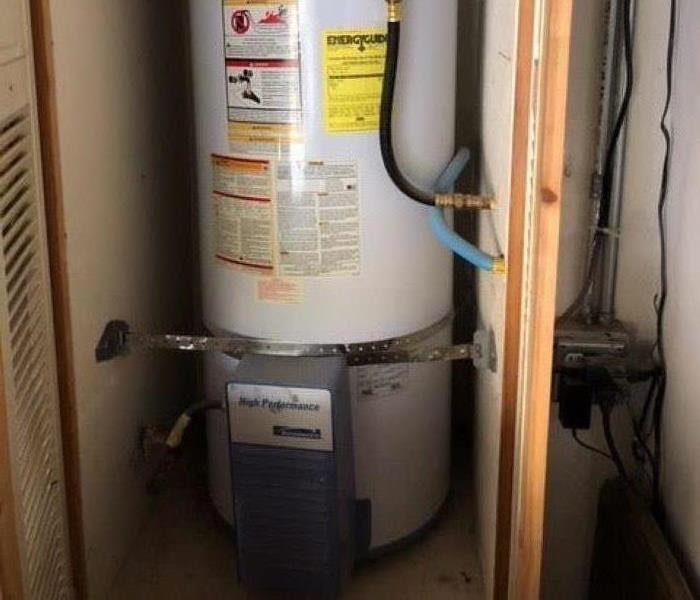 Keeping your hot water tank healthy is one way to avoid water damage in your home or business.
Keeping your hot water tank healthy is one way to avoid water damage in your home or business.
With an average tank size between fifty and one hundred gallons, leaking hot water tanks can be a major source of water damage problems and can flood an entire home and cause significant damage if not detected quickly. But how do you know if your hot water heater is about to fail?
A lack of hot water is the most common sign of a failing hot water heater. Rumbling, creaking or popping noises are another common indicator of an unhealthy water heater. This can mean that sediment is forming on the surface of the water heater or that the unit is on the verge of a crack or leak. Murky or foul-smelling water are also signs of a failing water heater. Additionally, the pressure relief valve opens to release pressure buildup in the water heater and can sometimes fail to function properly. This can have dangerous results and should be inspected by a plumber if you suspect a problem. And finally, pooling water beneath the unit can be a sign of a leaking water tank.
Pooling water beneath a hot water tank can lead to other, more dangerous problems. If your tank sits on a wood surface, the wood can become spongy and rot through if left wet for a long period of time. Be sure to act quickly if you know your hot water tank is leaking to avoid this problem.
If you see any of these common indicators, contact a plumber immediately to help determine the source of the problem. And if you do experience a water leak or damage of any kind, call the experts at SERVPRO of Vacaville/Fairfield/Dixon/Davis to help you remediate all of your water problems.
At SERVPRO of Vacaville/Fairfield/Dixon/Davis, we are experts at assessing water damage in your home or business, as well as removing standing water and drying out damaged materials. We are available 24 hours a day 7 days a week to answer your calls and respond to any and all water emergencies you may experience. Call us today at (707) 724-8977. We live and work in your community and we are here for you.
Eliminate Odor After Water Damage
6/18/2021 (Permalink)
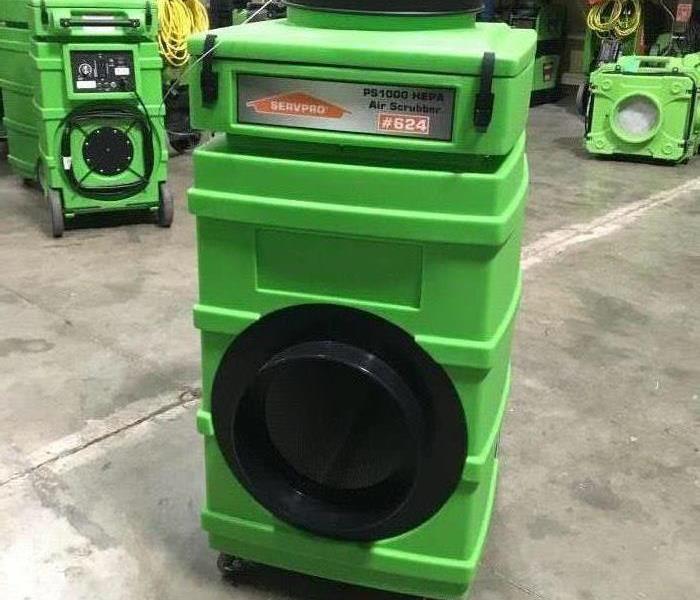 Air scrubbers can help eliminate odors left behind after water damage has occurred. Call SERVPRO today at (707) 724-8977 to see how we can help.
Air scrubbers can help eliminate odors left behind after water damage has occurred. Call SERVPRO today at (707) 724-8977 to see how we can help.
Dealing with the aftermath of water or flood damage can be an uphill battle for any homeowner or business owner. Water often seeps into structural cavities and creates a damp atmosphere. Not only does this pose a threat to the structural integrity of your home, it usually causes an odor problem. If not appropriately deodorized, this foul smell can linger in your home long after the water is gone.
Thankfully, here at SERVPRO, we use a multi-method approach to eliminate odors after a water damage to your property has occurred. Our IICRC certified professionals use modern equipment to eliminate odors due to flood damage in no time. Here are some of the deodorizing techniques used to ensure elimination of odors.
*Direct spraying: As the name implies, a deodorant is sprayed directly on the affected area using a pump. The method is useful if the intensity of the smell is not very high and the affected area is small.
*Wet fogging: This method utilizes Ultra Low Volume (ULV) foggers to dispense water or solvent-based deodorants. The ULV fogger generates minute particles of the chemicals that penetrate to the areas where the odor causing particles hide and change the composition of these substances.
*Thermal fogging: The technique involves using heat to break up solvent-based deodorants into small particles that can get to the difficult to reach places. The deodorizing particles neutralize the odor-causing molecules right at the source. Although this method is most popular to deodorize after smoke damage, it is sometimes used for flood damage as well.
*Venting box fans: These are high-velocity axial fans that are used to ventilate and improve air circulation. These fans are used both before and after the deodorizing process. They can significantly shorten the time to deodorize and remove moisture at the same time.
*Air Scrubbers: These devices are sophisticated air filters that use High-Efficiency Particulate Air (HEPA) filtration technology. The air scrubbers can capture and eliminate odor-causing particles as small as 0.3 micrometers with an efficiency of 99.97%.
Getting rid of the stale, clammy odor can be a difficult thing to do after water damage has occurred, but the professionals at SERVPRO of Vacaville/Fairfield/Dixon can help you eliminate the odor and get your home smelling like home again!
Call SERVPRO of Vacaville/Fairfield/Dixon at (707) 724-8977 to talk to one of our water damage restoration experts and discuss your deodorizing options. We are here 24 hours a day 7 days a week to help.
These 5 Appliances Cause the Most Water Damage
2/9/2021 (Permalink)
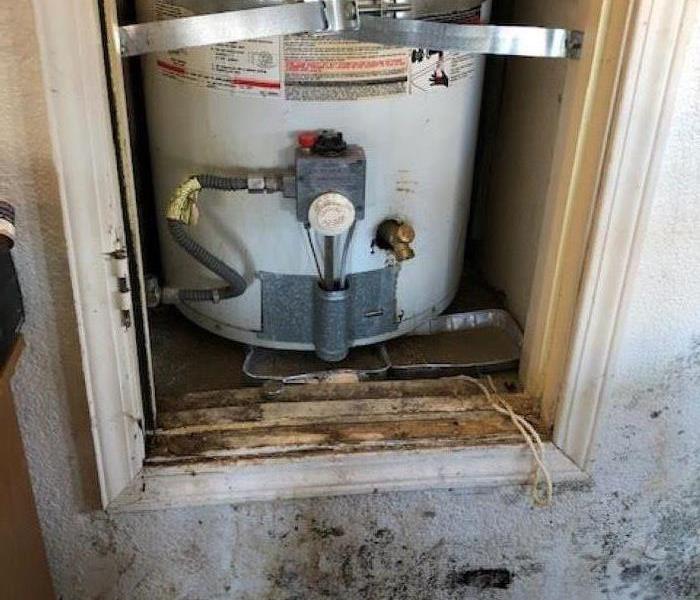 Water heaters are a major cause of water damage in homes. Call SERVPRO of Vacaville/Fairfield/Dixon if you experience water damage in your home.
Water heaters are a major cause of water damage in homes. Call SERVPRO of Vacaville/Fairfield/Dixon if you experience water damage in your home.
You may think that water damage only occurs in your home or workplace after a storm, but actually most water damage calls that we respond to come from appliances that we use on a daily basis. Here is a list of the most common culprits.
Refrigerators have all kinds of things that can go wrong and cause leaks: ice makers, water dispensers and condensation lines to name a few. Water lines are the most normal culprit for leaks.
Dishwashers most commonly get clogged due to the wrong type of detergent being used, which causes the machine to overflow. Small pieces of plastic may cover drain openings.
Washing Machines leak thanks to uneven loads of laundry or pinched water hoses. Sometimes a censor will fail to shut water off during filling.
Water Heaters cause more water damage in homes than any other appliance due to leakage. You can remove sediment and prevent clogs from forming by flushing your water tank every six months.
Attic-Installed Air Conditioners can create water damage when condensation drain lines are clogged, but an annual maintenance check on your unit will help keep it from malfunctioning when you need it most.
If you need help with any water damage issues, don’t wait. Call the experts at SERVPRO of Vacaville/Fairfield/Dixon right away at (707) 724-8977. We are here 24 hours a day 7 days a week to help you.
What to Do If You Experience Water Damage
11/11/2020 (Permalink)
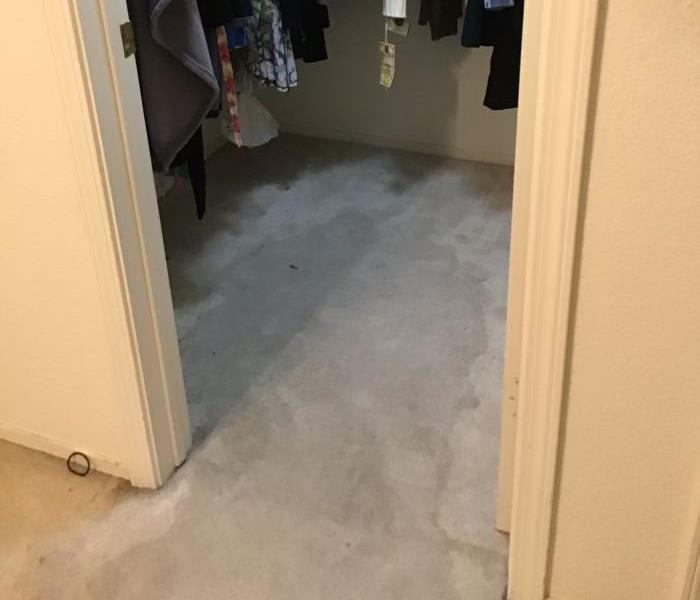 Water damage can happen anywhere in your home. Call the experts at SERVPRO of Vacaville/Fairfield/Dixon to help at (707) 724-8977.
Water damage can happen anywhere in your home. Call the experts at SERVPRO of Vacaville/Fairfield/Dixon to help at (707) 724-8977.
Everyone has questions about what to do if you experience water damage in your home. The first step would be to call the experts at SERVPRO of Vacaville/Fairfield/Dixon as soon as you notice any damage. Our restoration specialists have the experience, expertise and equipment to restore your property correctly. In the meantime, here are a few tips to keep in mind which may help minimize the damage to your home.
What To Do After Flooding
- Remove excess water by mopping and blotting.
- Wipe excess water from wood furniture.
- Remove and prop wet upholstery and cushions.
- Place aluminum foil or wood blocks between furniture legs and wet carpeting.
- During the summer, turn air conditioning on for maximum drying effect.
- Remove colored rugs from wet carpeting.
- Remove art objects to a safe, dry place.
- Hang leather goods and furs.
DON’T
- Don't use your household vacuum to remove water.
- Don't use your television or other household appliances.
- Don't turn on ceiling fixtures if the ceiling is wet and keep out of rooms where ceilings are sagging.
- Don't leave wet fabrics in place.
- Don't leave books, magazines or other colored items on wet carpet or floors.
The specialists at SERVPRO of Vacaville/Fairfield/Dixon are on call 24-hours a day 7 days a week to respond to your residential or commercial emergency. If you have any questions, give us a call today at (707) 724-8977. We’ll make it "Like it never even happened."
Don't Cause a Clog - Don't Flush Nemo!
10/27/2020 (Permalink)
One of the most common culprits of water damage in your home comes from overflowing toilets. Each flush of a toilet uses approximately 1.6 gallons of water, so if the water comes up and out of the bowl instead of going down the drain like it should, that’s equivalent to pouring a large container of milk all over your bathroom floor! One way to avoid overflowing toilets is to be extra careful about what you put down the drain, which is all a toilet really is.
Here are few things to be sure you DO NOT flush down your toilet:
*GUM – Gum is insoluble, which means it will never disintegrate. Plus, it is sticky, which is a bad combination in a toilet or sink.
*HAIR – Hair acts like a spider web and traps other items in the drain and causes clogs.
*YOUR PET FISH – We have all seen many movies with the family gathered around the toilet as they send their pet fish back to the ocean after it has taken his last gulp. The fact of the matter is that your pet fish may get caught in your pipes and cause a backup. Consider an alternative burial spot rather than the toilet bowl.
*WIPES – Even if they are labeled as flushable, wipes don’t disintegrate like toilet paper and should never be placed in the toilet.
*DENTAL FLOSS – Just like hair, dental floss can trap other items in the drain and cause clogs.
*MENSTRUAL PRODUCTS/DIAPERS – These products are meant to absorb moisture, not dissolve in it. Imagine what a disposal diaper looks like when it gets wet – then imagine that in your toilet drain. Not a good combination.
*FACIAL TISSUES/PAPER TOWELS – Although made of paper and sometimes used instead of toilet paper, they do not disintegrate like toilet paper. Throw these in the garbage can instead.
*COTTON BALLS – Although also paper based, these do not break down in your drains so don’t put them down the toilet.
*COOKING GREASE – Although liquid when it is hot, grease quickly thickens when it cools off, which can cause clogs in your drains. Keep it out of yours.
For bathtubs and showers, install a simple drain strainer to catch excessive hair and be sure to clean it out regularly. Make sure you deposit the debris in the garbage can and do not put it back down the sink or toilet.
Since we’re talking about clogged sinks, it’s important to mention one of the bigger sinks in the house…the kitchen sink. Obviously, the same rules apply as the bathroom sinks – if you wouldn’t put something down the bathroom sink, you shouldn’t put it down the garbage disposal either, even though it seems bigger and more capable of handling larger items. Here are a few other things you should never put down the kitchen sink or garbage disposal:
*Eggshells – If the inside of an egg can go in the garbage disposal, it only makes sense that the outside can too, right? Wrong! Egg shells get ground up into small pieces that actually get stuck to the sides of the pipes and can cause a backup. Be sure to throw eggshells into the waste can.
*Stickers from Produce – The adhesive on produce stickers can also get stuck inside your pipes and cause clogs. Be sure to remove the stickers before you place peelings from fruit and vegetables down the drain.
*Coffee Grounds – Although it might make your kitchen smell like a good cup of brew, coffee grounds cause more clogs in your kitchen sink than another other item. Be sure to keep them out of your sink drain.
If you do experience a toilet or sink backup and you end up with water where it shouldn’t be, call the experts at SERVPRO of Vacaville/Fairfield/Dixon. We are on-call 24 hours a day 7 days a week to handle your water emergency. You can reach us at (707) 724-8977. We are Here to Help.
Problems with Standing Water
6/17/2020 (Permalink)
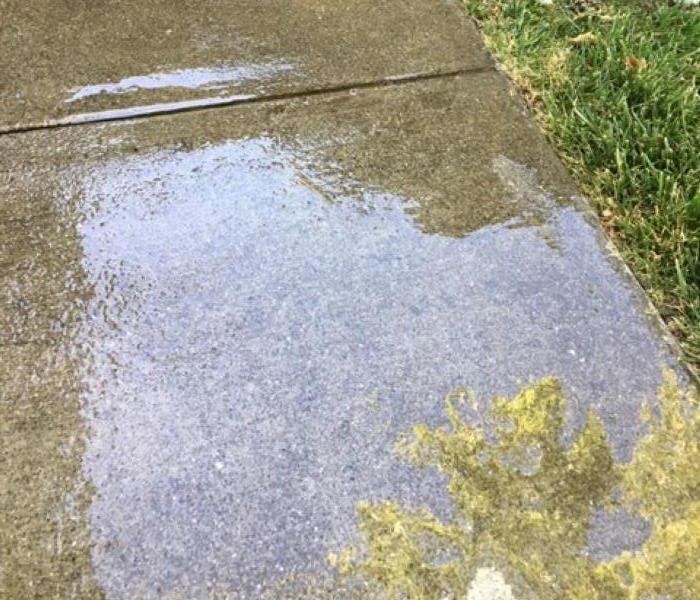 Standing water near your home can lead to many problems. Use these tips to avoid this summer dilemma.
Standing water near your home can lead to many problems. Use these tips to avoid this summer dilemma.
Summertime brings with it fun activities like squirt gun fights and running through the sprinklers, but what happens if the water from these activities don't drain away and result in pools of standing water? Even a small amount of water left undisturbed for a few days can cause a significant amount of problems. Outside, standing water can become a breeding ground for mosquitoes, which commonly breed in shallow pools of standing water and often carry diseases including malaria, West Nile virus, and Zika fever. Additionally, water left standing against your home may lead to problems with your home’s foundation.
Here are a few things to check to make sure you don't have any potential hazards around your home.
- Empty, drain or cover all things that can and may hold standing water
- Change water collection pans for plant pots weekly
- Clean bird baths on a regular basis
- Check your landscaping drainage and ensure that it drains away from your home
- Be sure you are not overwatering your lawn. Adjust the watering schedule the water less frequently or for shorter periods of time.
Water can provide a lot of fun during the summer months, but it can cause some problems. Use these ideas to keep your home safe from standing water pitfalls.
Is Your Hot Water Heater Healthy?
6/16/2020 (Permalink)
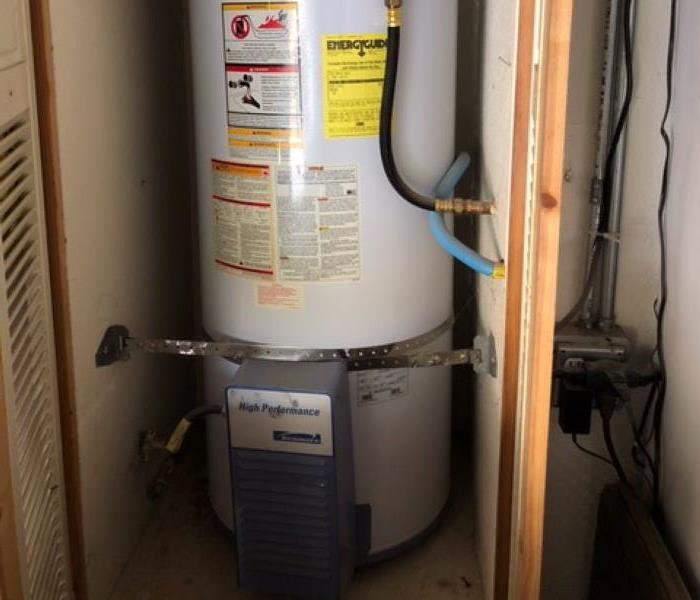 Keeping your hot water tank healthy is one way to avoid water damage in your home or business.
Keeping your hot water tank healthy is one way to avoid water damage in your home or business.
With an average tank size between fifty and one hundred gallons, leaking hot water tanks can be a major source of water damage problems and can flood an entire home and cause significant damage if not detected quickly. But how do you know if your hot water heater is about to fail?
A lack of hot water is the most common sign of a failing hot water heater. Rumbling, creaking or popping noises are another common indicator of an unhealthy water heater. This can mean that sediment is forming on the surface of the water heater or that the unit is on the verge of a crack or leak. Murky or foul-smelling water are also signs of a failing water heater. Additionally, the pressure relief valve opens to release pressure buildup in the water heater and can sometimes fail to function properly. This can have dangerous results and should be inspected by a plumber if you suspect a problem. And finally, pooling water beneath the unit can be a sign of a leaking water tank.
Pooling water beneath a hot water tank can lead to other, more dangerous problems. If your tank sits on a wood surface, the wood can become spongy and rot through if left wet for a long period of time. Be sure to act quickly if you know your hot water tank is leaking to avoid this problem.
If you see any of these common indicators, contact a plumber immediately to help determine the source of the problem. And if you do experience a water leak or damage of any kind, call the experts at SERVPRO of Vacaville/Fairfield/Dixon to help you remediate all of your water problems.
At SERVPRO of Vacaville/Fairfield/Dixon, we are experts at assessing water damage in your home or business, as well as removing standing water and drying out damaged materials. We are available 24 hours a day 7 days a week to answer your calls and respond to any and all water emergencies you may experience. Call us today at (707) 724-8977. We live and work in your community and we are here for you.
Deodorizing After Water Damage
6/16/2020 (Permalink)
Dealing with the aftermath of water or flood damage can be an uphill battle for any homeowner or business owner. Water often seeps into structural cavities and creates a damp atmosphere. Not only does this pose a threat to the structural integrity of your home, it usually causes an odor problem. If not appropriately deodorized, this foul smell can linger in your home long after the water is gone.
Thankfully, here at SERVPRO, we use a multi-method approach to eliminate odors after a water damage to your property has occurred. Our IICRC certified professionals use modern equipment to eliminate odors due to flood damage in no time. Here are some of the deodorizing techniques used to ensure elimination of odors.
*Direct spraying: As the name implies, a deodorant is sprayed directly on the affected area using a pump. The method is useful if the intensity of the smell is not very high and the affected area is small.
*Wet fogging: This method utilizes Ultra Low Volume (ULV) foggers to dispense water or solvent-based deodorants. The ULV fogger generates minute particles of the chemicals that penetrate to the areas where the odor causing particles hide and change the composition of these substances.
*Thermal fogging: The technique involves using heat to break up solvent-based deodorants into small particles that can get to the difficult to reach places. The deodorizing particles neutralize the odor-causing molecules right at the source. Although this method is most popular to deodorize after smoke damage, it is sometimes used for flood damage as well.
*Venting box fans: These are high-velocity axial fans that are used to ventilate and improve air circulation. These fans are used both before and after the deodorizing process. They can significantly shorten the time to deodorize and remove moisture at the same time.
*Air Scrubbers: These devices are sophisticated air filters that use High-Efficiency Particulate Air (HEPA) filtration technology. The air scrubbers can capture and eliminate odor-causing particles as small as 0.3 micrometers with an efficiency of 99.97%.
Getting rid of the stale, clammy odor can be a difficult thing to do after water damage has occurred, but the professionals at SERVPRO of Vacaville/Fairfield/Dixon can help you eliminate the odor and get your home smelling like home again!
Call SERVPRO of Vacaville/Fairfield/Dixon at (707) 724-8977 to talk to one of our water damage restoration experts and discuss your deodorizing options. We are here 24 hours a day 7 days a week to help.
Top 5 Appliances That Cause Water Damage
2/14/2020 (Permalink)
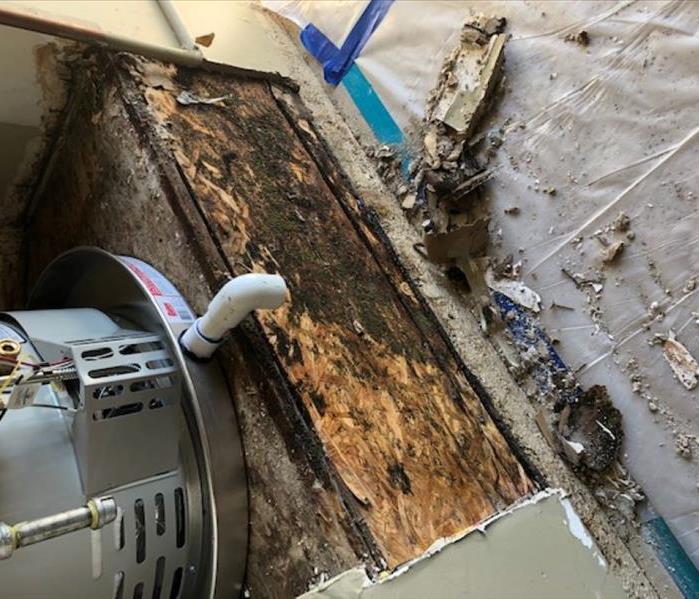 The base of this water heater suffered severe water damage from leakage. If you experience a similar problem, call the experts at SERVPRO of Vacaville
The base of this water heater suffered severe water damage from leakage. If you experience a similar problem, call the experts at SERVPRO of Vacaville
You may think that water damage only occurs in your home or workplace after a storm, but actually most water damage calls that we respond to come from appliances that we use on a daily basis. Here is a list of the most common culprits.
Refrigerators have all kinds of things that can go wrong and cause leaks: ice makers, water dispensers and condensation lines to name a few. Water lines are the most normal culprit for leaks.
Dishwashers most commonly get clogged due to the wrong type of detergent being used, which causes the machine to overflow. Small pieces of plastic may cover drain openings.
Washing Machines leak thanks to uneven loads of laundry or pinched water hoses. Sometimes a censor will fail to shut water off during filling.
Water Heaters cause more water damage in homes than any other appliance due to leakage. You can remove sediment and prevent clogs from forming by flushing your water tank every six months.
Attic-Installed Air Conditioners can create water damage when condensation drain lines are clogged, but an annual maintenance check on your unit will help keep it from malfunctioning when you need it most.
If you need help with any water damage issues, don’t wait. Call the experts at SERVPRO of Vacaville right away at (707) 724-8977. We are here 24 hours a day 7 days a week to help you.
Use These Water Damage Emergency Tips
11/1/2019 (Permalink)
If you experience water damage in your home, be sure to call the experts at SERVPRO of Vacaville as soon as you notice any damage. Our restoration specialists have the experience, expertise and equipment to restore your property properly. In the meantime, here are a few tips to keep in mind which may help minimize the damage done to your home.
What To Do After Flooding
- Remove excess water by mopping and blotting.
- Wipe excess water from wood furniture.
- Remove and prop wet upholstery and cushions.
- Place aluminum foil or wood blocks between furniture legs and wet carpeting.
- During the summer, turn air conditioning on for maximum drying effect.
- Remove colored rugs from wet carpeting.
- Remove art objects to a safe, dry place.
- Hang leather goods and furs.
DON’T
- Don't use your household vacuum to remove water.
- Don't use your television or other household appliances.
- Don't turn on ceiling fixtures if the ceiling is wet, and keep out of rooms where ceilings are sagging.
- Don't leave wet fabrics in place.
- Don't leave books, magazines or other colored items on wet carpet or floors.
The specialists at SERVPRO of Vacaville are on call 24-hours a day to respond to your residential or commercial emergency. If you have any questions, give us a call today at (707) 724-8977.
Sprinklers Can Cause Water Damage Inside Your Home
8/19/2019 (Permalink)
When looking for the source of water damage or mold inside your house, sometimes you need to look outside your home for the cause of the water damage. One area that may get overlooked is your sprinkler system.
If there is a stained arch on the side of the house or the wall is wet and there are sprinklers nearby, then most likely the sprinklers are spraying the side of the house. Sprinkler heads should be checked to see if they are pointed the wrong direction or if they are broken. When adjusting the sprinkler heads, a check of the wall's condition should also be done. Any damaged wall areas should be repaired, which will help prevent future water intrusion.
Occasionally if the sprinklers have gotten the wall area wet over a long period of time and the moisture has penetrated the wall, then mold or mildew may have developed. If this is the case, call the professionals at SERVPRO of Vacaville. They can respond immediately to any signs of mold or mildew and help with mold and mildew remediation. Call us today at 707-724-8977.
What Causes Air Conditioner Leaks?
8/12/2019 (Permalink)
Air conditioning leaks can be very costly. They are both messy and can potentially cause significant water damage to your home or place of business. Knowing what causes water leaks in your central air conditioning system can help you avoid some problems before they become big disasters.
The most frequent cause of water leakage from a central air conditioning system is a clogged drain pipe which can make your system’s drain pan overflow. Drain lines can become clogged with dirt, rust, algae and other debris. One way to avoid this problem is to add a safety pan under your AC unit to catch drain pan overflow.
Disconnected drain lines allow condensate to drain through the ceiling or onto the floor of a home, causing major damage. This can happen when improperly installed drain pipe fittings loosen over time and disconnect from the unit. To avoid this problem, make sure that your central AC system has a secondary drain line, especially if your air handler is in the attic.
You should also clean or change your HVAC air filter regularly and make sure that your AC refrigerant levels are checked regularly.
If your air conditioning unit leaks, call the professionals at SERVPRO of Vacaville. They know just how to take care of any water damage, mold remediation or mildew damage to your home and are available 24 hours a day 7 days a week to help you with any of your restoration needs. Call SERVPRO of Vacaville today at 707-724-8977.
Standing Water Pitfalls
6/14/2019 (Permalink)
Summertime brings with it fun activities like squirt gun fights and running through the sprinklers, but what happens if the water from these activities don't drain away and result in pools of standing water? Stagnant water is a breeding ground for bacteria, mold and parasites that can be harmful to your health. Mosquitoes commonly breed in shallow pools of standing water and often carry diseases including malaria, West Nile virus, and Zika fever.
Here are a few things to check to make sure you don't have any potential hazards around your home.
- Empty, drain or cover all things that can and may hold standing water
- Change water collection pans for plant pots weekly
- Clean bird baths on a regular basis
- Check your landscaping drainage and ensure that it drains away from your home
Water can provide a lot of fun during the summer months, but it can cause some problems. Use these ideas to keep your home safe from standing water pitfalls.
Is Your Hot Water Heater Healthy?
6/12/2019 (Permalink)
At SERVPRO of Vacaville, we are experts at assessing water damage in your home or business, as well as removing standing water and drying out damaged materials. With an average tank size between 30 and 50 gallons, leaking hot water tanks can be a major source of water damage problems and can flood an entire home and cause significant damage if not detected quickly. But how do you know if your hot water heater is about to fail?
A lack of hot water is the most common sign of a failing hot water heater. Rumbling, creaking or popping noises are another common indicator of an unhealthy water heater. This can mean that sediment is forming on the surface of the water heater or that the unit is on the verge of a crack or leak. Murky or foul-smelling water are also signs of a failing water heater. Additionally, the pressure relief valve opens to release pressure buildup in the water heater and can sometimes fail to function properly. This can have dangerous results and should be inspected by a plumber if you suspect a problem. And finally, pooling water beneath the unit can be a sign of a leaking water tank.
If you see any of these common indicators, contact a plumber immediately to help determine the source of the problem. And if you do experience a water leak or damage of any kind, call SERVPRO of Vacaville at (707) 724-8977 to remediate all of your water problems.
It's the Water You Don't See That Causes the Most Damage
3/15/2019 (Permalink)
Your home should be your place of rest. But when water begins leaking - even small leaks in areas you can’t see - your home could quickly become a source of stress. The possibility of harmful mold, rot and unseen damage may affect the value of your home, and even more importantly, the health of your loved ones.
SERVPRO of Vacaville understands how disruptive water damage can be for your entire family and will help ensure that the source of the water is identified. That’s why we offer 24-hour emergency response by trained professionals. With top-of-the-line equipment and time-tested cleanup and restoration techniques, SERVPRO of Vacaville Professionals have the expertise to help make your house feel like home again. Call us at (707) 724-8977 and we’ll be sure to make sure we take care of you, no matter how big or small your problem is.
Water Damage Emergency Tips
11/7/2018 (Permalink)
What you Can Do Until Help Arrives
No one wants to deal with water damage to your home, and hopefully it’s not something that happens often. When it does, be sure to call SERVPRO of Vacaville, a water damage repair and restoration specialist, as soon as you notice any damage. We have the experience, expertise and equipment to restore your property properly. In the meantime, here are a few tips to keep in mind which may help minimize the damage done to your home.
What To Do After Flooding
- Remove excess water by mopping and blotting.
- Wipe excess water from wood furniture after removal of lamps and tabletop items.
- Remove and prop wet upholstery and cushions.
- Place aluminum foil or wood blocks between furniture legs and wet carpeting.
- Turn air conditioning on for maximum drying in summer.
- Remove colored rugs from wet carpeting.
- Remove art objects to a safe, dry place.
- Gather loose items from floors.
- Hang furs and leather goods.
What NOT To Do After Flooding
- Don't leave wet fabrics in place.
- Don't leave books, magazines or other colored items on wet carpet or floors.
- Don't use your household vacuum to remove water.
- Don't use your television or other household appliances.
- Don't turn on ceiling fixtures if the ceiling is wet, and keep out of rooms where ceilings are sagging.
Having to deal with water damage can be frustrating and confusing, but the specialists at SERVPRO of Vacaville are on call 24-hours a day to respond to your residential or commercial emergency. If you have any questions, give us a call today at (707) 724-8977.




 24/7 Emergency Service
24/7 Emergency Service




